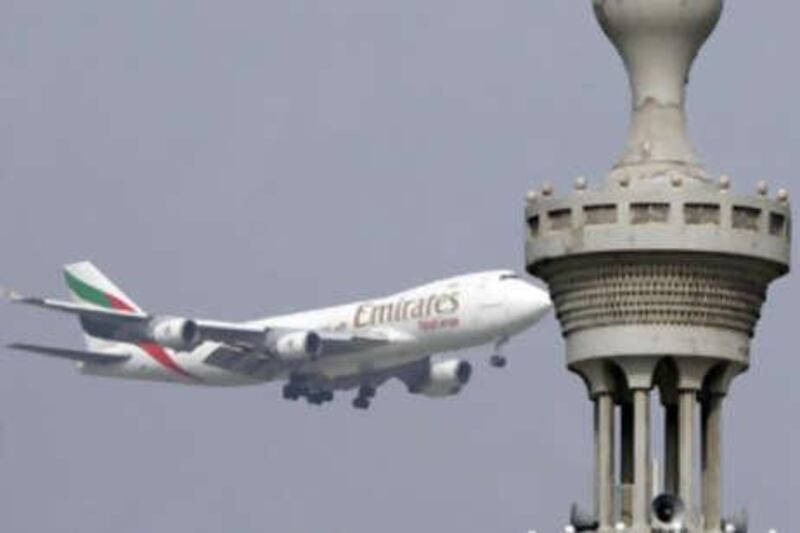Record fuel prices dragged down first-half year gains for Emirates Airline, which reported a small profit of Dh284 million (US$77m) during one of the most challenging periods in aviation history. The Dubai airline saw profits fall by 88 per cent compared with the same April-to-October period last year, when it had a bumper first half with Dh2.36 billion in income. "Emirates has worked hard to manage the impact of high fuel prices on our unit costs, while continuing to grow our business and provide our customers with a quality product," said Sheikh Ahmed bin Saeed, the chairman and chief executive of the airline. The sharp downturn in profits came despite the airline reporting a 31 per cent jump in revenues to Dh22.1bn, after it opened new routes and increased capacity by 13 per cent. The rapid rise of crude oil this year pushed the company's unit costs up by 40 per cent, the airline said, adding that its cash position deteriorated significantly in the past six months from Dh12.6bn to Dh8.4bn. $1bn of that was due to paying the Dubai Government a dividend from the previous financial year, as well as pre-delivery payments to Boeing and Airbus. It also experienced costs arising from upgrading of its fleet. More than 30 airlines have filed for bankruptcy this year as record fuel prices, falling demand and deteriorating credit markets has created one of the most difficult environments for airlines this century. In the past week, a spate of bad news has hit the industry. ALMA, a budget carrier operating from Guadalajara, Mexico, became the third Mexican carrier in the past few weeks to cease operations, while Singapore Airlines said its July-September profit dropped 36 per cent, to $219 million, as the high price of fuel hit. Similarly, British Airways reported a consolidated net loss of £49m (Dh282.6m) in the six months ending Sept 30 due to fuel and the economic downturn. Despite the gloom and doom, however, several recent announcements suggest until now, Gulf airlines have shown resilience in finding new debt amid a deteriorating banking climate. Yesterday, Qatar Airways secured a US$500 million loan from a consortium of international banks to finanace the arrival of new Boeing 777-300ER aircraft. Bank of Tokyo-Mitsubishi, BNP Paribas, Deutsche Bank, Standard Chartered and Sumitomo Mitsui Banking Corp Europe participated in the 12-year lease deal, which was overseen by Standard Chartered. Akbar al Baker, the chief executive of Qatar Airways, said the deal demonstrated the confidence international lenders had in the carrier "as an airline with a strong vision to grow its international network". The Qatar deal follows $250m in loans to Etihad Airways, sealed in September, to finance two long-haul A340-600 aircraft from Airbus. The loans were arranged through a consortium of banks that included Al Hilal Bank. Etihad and Al Hilal are expected to announce a secondary financing pact later this month. The financing needs for Gulf airlines are immense, after signing deals worth tens of billions of dollars for wide-bodied aircraft during the economic boom of the past few years. Qatar Airways has more than 150 aircraft on order, including another 32 Boeing 777 deliveries worth $8bn coming in the next few years. Emirates Airline has more than 200 aircraft on order worth an estimated $60bn, and recently said it would not need to go back to the markets for debt for the next eight months. Etihad ordered up to 205 aircraft from Boeing and Airbus this summer, worth up to $43bn if all options are exercised. Air Arabia, the Sharjah-based budget carrier, will see its financing needs rise in 2010, when it receive the first of 49 Airbus A320 aircraft, worth $3.5bn. With a global recession looming, the recent loan deals are no guarantee of success, and there are concerns that carriers may find both passengers and credit harder to come by. Kareem Murad, a vice president of research at Shuaa Capital, said only carriers with low debt and high cash positions would receive favourable loan terms. "Its definitely not going to be as easy as it used to be," he said. igale@thenational.ae
Fuel costs hit Emirates Airline
Record fuel prices dragged down first-half gains for Emirates Airline, which reported a small net profit.

Editor's picks
More from the national





